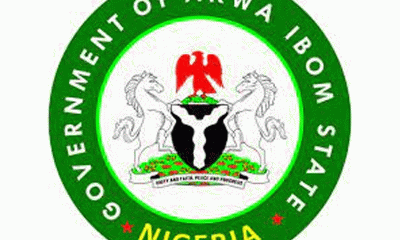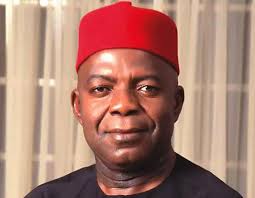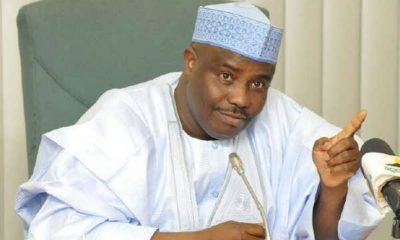Business News
Reps Reject Disengagement of Local Contractor from $100m Loan to Fight Malaria

By Ubong Ukpong, Abuja
The House of Representatives Committee on HIV/AIDS, Tuberculosis and Malaria has lampooned the Ministry of Health over the disengagement of a local contractor in a $100 million loan agreement between Nigeria and the Islamic Development Bank meant to address the challenge of malaria in the country.
Chairman of the Committee, Hon Amobi Ogah in a stakeholders meeting to address the matter was displeased that succour that was expected through the intervention was yet to materialize even after signing the agreement in 2022.
In his ruling at the meeting, Amobi directed that Minister of Health, Prof Ali Muhammad Pate, who was in attendance to provide a comprehensive report of the transactions pertaining to the agreement to the committee within two weeks.
The report is expected to explain in detail why the local vendors approved for the agreement were disqualified and not given access to the job.
Amobi said the meeting was to resolve the logjam that seemed to have crippled the implementation of the Islamic Bank Loan to support malaria elimination in Nigeria under the Lives and Livelihood Project.
He said the project aims to reduce under-five mortality in Nigeria from 132 to 79 per 1,000 births by 2030.
“We are aware that Malaria continues to exert a huge burden on majority of Nigerians, with the greatest toll affecting children under 5 and pregnant women. Nigeria contributes 27% of the global malaria cases, (World Malaria Report, 2021) and 31% of global Malaria deaths. In view of this sad story every effort must be made to support any initiative that attempts to reduce or eliminate malaria burden in Nigeria.
“However we are at a loss as to the reason why the Loan agreement between Nigeria and the Islamic Bank which is expected to last for 3 years, that is terminating by end of this year, has suffered monumental setback and we as the Parliament, representing the people of Nigeria who are affected and ravaged daily by malaria epidemic cannot fold our hands and watch matters degenerate so badly, hence our intervention in this matter.
“The Committee on ATM under my leadership has set a clear vision that it will no longer be business as usual, that Nigeria and Nigerians should be the focus of Government policies and programs. It is said that when two elephants fight, it is the grass that suffers and, in this case, we know the grass; the grass is Nigerians ravaged and battered by malaria and the opportunity to receive succour through the intervention of the Islamic Bank loan is yet to materialise after the signing of agreement in 2022. We however, don’t know whether the Elephants fighting here is the Ministry of Health and Social Welfare? Or is it the Local Manufacturers of Insecticidal Nets? Or is it UNOPS?
“While the Committee is eager to hear from all the parties involved in this saga, we will make it categorically clear that as a Parliament we will not tolerate any entity that will toy with the lives of our people, we must think locally and grow our local capacity to ensure that malaria is eradicated from our Country.
“There is nowhere in the world that sovereign laws of a State are not respected and obeyed and the Parliament will guard jealously the laws of the Federal Republic of Nigeria as it relates to Executive Orders and no entity or non state actors should go contrary to these Laws.
“We must put our House in order if we must win the fight against malaria, we cannot continue to pursue shadows and keep running in cycles while leaving out the substance and our people are worst for it. We must say enough is enough and be genuinely ready to do something meaningful for Nigeria and Nigerians. Therefore this contractual logjam must be resolved today one way or the other,” he said.
The Health Minister, Pate, said the agreement was reversed because there were issues with the local producer.
He said according to the design of the loan, there was an agreement by the government to utilise a United Nations procurement agent, UNOPS, and a Memorandum of Understanding was signed.
“The provisions for all commodities, drugs test kits would be channelled through UNOPS in particular, those that are going to be produced here should be bought here. For bed nets in specific terms, the original MOU was for the bed nets to be procured using national competitive bidding on the assumption that they were three local producers who are prequalified.
“Of the three only one was prequalified and that is the company in the country that was to be involved. The tender process started in early 2023. The process ran into procedural difficulty and it was suspended by UNOPS in an open and transparent manner and investigated. Consequently the MOU was reversed because there were issues with this sole producer. Amendment was made to go for international competitive bidding and that revised MOU was signed by a member of the government,” he said.
He acknowledged that the country still has a malaria challenge and the Islamic Development Loan is a major effort that started four years ago as part of Nigeria’s effort to achieve malaria elimination.
He said, “It is a $100 million loan that was meant for five states, Bayelsa, Edo, Enugu, Kogi and FCT. The Federal Government signed and negotiated the loan and also state level legal agreements with those five entities were constructed by the Islamic Development Bank though and the Ministry of Finance so that they are borrowing that money to implement the malaria programme.”
According to him, the $100 million dollars consisted of a $90 million loan that is repayable and a $10 million grant.
He said, “This was done in 2020 and the implementation activity started. Since that loan was signed and became effective, a total of $62 million was disbursed through the UNOPS in two tranches. For the Ministry of Health only $201, 000 dollars has been spent from the proceeds at the federal level.
“Of what has been disbursed to UNOPS as the procurement agent as per the agreement that was designed and signed by the federal government on behalf of those states for this loan, there is a balance of $54 million that is still with UNOPS. So only about $8 million dollars has been utilised in buying drugs, kits, and commodities necessary as part of the programme and on their way to be delivered because UNOPS was agreed to be the procurement agents.
“So the $54 million that is at hand is what we are looking at how it can be executed. There is another part of the loan that has not yet been disbursed to UNOPS. So if you look at it almost 90 percent of this resource is yet to be activated and 98 percent of it all is yet to be activated and utilised.”
Director and Representative of the UNOPS, Ghana Multi Country Office, Ifeoma Charles-Monwuba, said there was an anomaly with local contractor lacked capacity hence the need to terminate their agreement.
She said, “The agreement with UNOPS was signed in September 2022, however there was a clause inserted that meant that that if it did not become effective until December 2022 and by January 2023 we did a training for local vendors that were supposed to participate, we did a training for them and by February 2023 the tender launched.
“Like the Minister said in evaluating particularly the bed nets, they were issues. For the antimalarial drugs, all the anti medicines have been procured and all locally procured. All have undergone quality control testing and we have written to the national malaria programme to bring the distribution list so the local manufacturer can distribute that.
“So local manufacturing and procurement of medicine has been done. For the medicine not manufactured locally, it was agreed to be procured internationally. Shipments have started arriving. All the other products are already on track and it’s the bed nets that is the issue.”
The Committee said according to a submission by UNOPS, a United Nations agent, employed as the procurement agent for the project the reasons for dropping the local contractor were unclear.
It said according to the submission there were conflicting reasons given for the action including that it was due to an anomaly, that the local contractor lacked capacity, that they needed to change specifications and that they had information from a whistleblower on why the agreement should be discontinued.
Responding, the Committee Chairman, Ogah, said, “With due respect, what UNOPS has done in this transaction is so bad because if they can tell us as a country that they cannot tell us what the local manufacturer has done that made them disqualify this local manufacturer. The reason why we are all here is because of Nigeria. If it is a grant or aid it would be different. We are here because it is a loan that we are going to pay back with interest. We demand a report from the Ministry
“Anything that would undermine our quest to encourage local producers and manufacturers we seriously frown on it. All of a sudden the whole intent and purpose were changed in favour of foreign bid to supply the materials whereas as we have one which you earlier pre-qualified and all of a sudden it was set aside to encourage foreigners to supply the net in Nigeria,” he said.
The Speaker, Rt Hon Tajudeen Abbas, who was represented by the House Leader, Prof Julius Ihonvbare, hoped the matter would be resolved amicably.
“With the calibre of members of the committee, I have no doubt that whatever is causing the challenge would be resolved.
“We have a commitment to protect the local market and producers and encourage local production to prevent capital flight and encourage the development of skills and capacity to do better.
“We are shocked the matter has lasted this long. Many of us come from rural constituencies with poor access to medical services and we know now our people are suffering, so for an Mou to be signed and it has taken over four years is an embarrassment and hope we can resolve the matter and find the way forward,” he said
Business News
Tinubu Congratulates Dangote on World Bank Appointment

By Jennifer Enuma, Abuja
President Bola Tinubu has congratulated Alhaji Aliko Dangote, the President of Dangote Group, on his appointment to the World Bank’s Private Sector Investment Lab, a body tasked with promoting investment and job creation in emerging economies.
In a statement by Special Adviser on Media and Publicity, Bayo Onanauga, the President described the appointment as apt, given Dangote’s rich private sector experience, strategic investments, and many employment opportunities created through his Dangote Group.
The Dangote Group became one of Africa’s leading conglomerates through innovation and continuous investment.
Dangote Group’s business interests span cement, fertiliser, salt, sugar, oil, and gas. However, the $20 billion Dangote Petroleum Refinery and Petrochemicals remains Africa’s most daring project and most significant single private investment.
“President Tinubu urges Dangote to bring to bear on the World Bank appointment his transformative ideas and initiatives to impact the emerging markets across the world fully” the statement said.

The World Bank announced Dangote’s appointment on Wednesday, as part of a broader expansion of its Private Sector Investment Lab. The lab now enters a new phase aimed at scaling up solutions to attract private capital and create jobs in the developing world.
The CEO of Bayer AG, Bill Anderson, the Chair of Bharti Enterprises, Sunil Bharti Mittal, and the President and CEO of Hyatt Hotels Corporation, Mark Hoplamazian, are on the Private Sector Investment Lab with Dangote.
The World Bank said the expanded membership brings together business leaders with proven track records in generating employment in developing economies, supporting the Bank’s focus on job creation as a central pillar of global development.
Business Analysis
Nigeria Customs Generates over N1.75trn Revenue in 2025
By Joel Oladele, Abuja
The Nigeria Customs Service (NSC) has generated an impressive N1,751,502,252,298.05 in revenue during the first quarter of 2025.
The Comptroller-General (CG) of the Service, Bashir Adeniyi, disclosed this yesterday, during a press briefing in Abuja.
According to Adeniyi, the achievement not only surpasses the quarterly target but also marks a substantial increase compared to the same period last year, reflecting the effectiveness of recent reforms and the dedication of customs officers across the nation.
“This first quarter of 2025 has seen our officers working tirelessly at borders and ports across the nation.
I’m proud to report we’ve made real progress on multiple fronts—from increasing revenue collections to intercepting dangerous shipments,” Adeniyi stated.He attributed this success to the reforms initiated under President Bola Tinubu’s administration and the guidance of the Honourable Minister of Finance and Coordinating Minister of the Economy, Olawale Edun.
The CG noted that the revenue collection for Q1 2025 exceeded the quarterly benchmark of N1,645,000,000,000.00 by N106.5 billion, achieving 106.47% of the target. This performance represents a remarkable 29.96% increase compared to the N1,347,705,251,658.31 collected in Q1 2024.
Adeniyi highlighted the month-by-month growth, noting that January’s collection of N647,880,245,243.67 surpassed its target by 18.12%, while February and March also showed positive trends.
“I’m pleased to report the Service’s revenue collection for Q1 2025 totaled N1,751,502,252,298.05.
“Against our annual target of N6,580,000,000,000.00, the first quarter’s proportional benchmark stood at N1,645,000,000,000.00. I’m proud to announce we’ve exceeded this target by N106.5 billion, achieving 106.47% of our quarterly projection. This outstanding performance represents a substantial 29.96% increase compared to the same period in 2024, where we collected N1,347,705,251,658.31.
“Our month-by-month analysis reveals even more encouraging details of this growth trajectory,” Adeniyi said.
In addition to revenue collection, Adeniyi said the NCS maintained robust anti-smuggling operations, recording 298 seizures with a total Duty Paid Value (DPV) of ₦7,698,557,347.67.
He stated that rice was the most seized commodity, with 135,474 bags intercepted, followed by petroleum products and narcotics.
“From rice to wildlife, these seizures show our targeted approach,” Adeniyi remarked, noting the NCS’s commitment to combating smuggling and protecting national revenue.
Adeniyi also highlighted key initiatives, including the expansion of the B’Odogwu customs clearance platform and the launch of the Authorized Economic Operators Programme, which aims to streamline processes for compliant businesses. The NCS’s Corporate Social Responsibility Programme, “Customs Cares,” was also launched, focusing on education, health, and environmental sustainability.
Despite these achievements, the CG noted that the NCS faced challenges, including exchange rate volatility and non-compliance issues. Adeniyi acknowledged the need for ongoing adaptation and collaboration with stakeholders to address these challenges effectively.
Looking ahead, the NCS aims to continue its modernization efforts and enhance service delivery, ensuring that it remains a critical institution in Nigeria’s economic and security landscape.
“Results speak louder than plans; faster clearances through B’Odogwu, trusted traders in the AEO program, and measurable food price relief from our exemptions. We’ll keep scaling what works,” he concluded.
BUSINESS
NSIA Net Assets Hit N4.35trn in 2024
By Tony Obiechina Abuja
The Nigeria Sovereign Investment Authority (NSIA) yesterday disclosed that its net assets grew from N156bn in 2013 to N4.35 trillion in 2024.
Similarly, the Authority has remained profitable for 12 consecutive years, leading to cumulative retained earnings of N3.
74 trillion in 2024.Managing Director and Chief Executive Officer of NSIA, Aminu Umar- Sadiq made these disclosures at a media engagement in Abuja, highlighting its audited financial results for the 2024 fiscal year.
According to him, the results underscored the resilience of the authority’s investment strategy and the strength of its earnings, driven by a well-diversified revenue base and robust risk management practices, despite a challenging global macroeconomic and geopolitical environment.
Total operating profits, excluding share of profits from associates and Joint Venture (JV) entities, increased from N1.17 trillion in 2023 to N1.86 trillion in 2024, driven by the strong performance of
NSIA’s diversified investment portfolio, infrastructure assets, gains from foreign exchange movements, and derivative valuations.
In addition, Total Comprehensive Income (TCI), inclusive of share of profits from associates and JV entities, reached N1.89 trillion in 2024, reflecting a 59 per cent increase from N1.18 trillion in 2023.
Core TCI (excluding foreign exchange and derivative valuation gains) rose by 148 per cent to N407.9 billion in 2024 compared to N164.7 billion in 2023, supported by robust returns on financial assets measured at fair value through profit and loss, including collateralised securities, private equity, hedge funds, and Exchange-Traded Funds (ETFs).
Umar-Sadiq said the authority’s outstanding financial performance in 2024 reflected the “strength of our strategic vision, disciplined execution and unwavering commitment to sustainable socio-economic advancement.”
He said, “By leveraging innovation, strategic partnerships and sound risk management, we have not only delivered strong returns but also created value for our stakeholders
“As we move forward, we remain focused on driving economic transformation, expanding opportunities, scaling transformative impact and ensuring long-term prosperity for current and future generations of Nigerians.”
The CEO reaffirmed the authority’s commitment to managing the country’s SWF, and delivering the mandates enshrined in the NSIA Act.
He said NSIA remained poised to continually create long-term value for its stakeholders by delivering excellent risk-adjusted financial results, developing a healthy and well-diversified portfolio of assets and large-scale infrastructure projects, and enhancing the desired social outcomes.
He noted that NSIA was committed to its mandate of prudent management and investment of Nigeria’s sovereign wealth.
“In adherence to its Establishment Act, NSIA prioritises transparency, disclosure, and effective communication with all stakeholders and counterparties,” he said.
He pointed out that in the year under review, a new board, led by Olusegun Ogunsanya as Chairman, was appointed by President Bola Tinubu, in accordance with the provisions of the NSIA Act.
The new board will provide strategic direction and oversight, in addition to playing a pivotal role in critical decision making.
He remarked that under the guidance of the Board, the Authority will retain focus on its primary mandate of creating shared value for all stakeholders based on its continued adoption of corporate governance practices.
“NSIA prides itself an investment institution of the federation established to manage funds in excess of budgeted oil revenues and its mission is to play a pivotal role in driving sustained economic development for the benefit of all Nigerians through building a savings base for the Nigerian people, enhancing the development of the county’s infrastructure, and providing stabilisation support in times of economic misadventure,” he added.



















